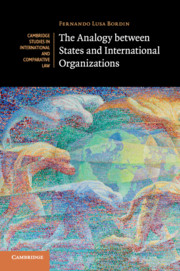'In this book, Dr Fernando Lusa Bordin explores an elusive but fundamental problem: How does general international law apply to international organizations? That leads him to ask, in depth and with great subtlety, the questions what international organizations are from the point of view of international law and how they fit within the international legal system. By analysing the extent to which States and international organizations can be analogised, and how that analogy has served - and can serve - as a basis to extend rules from one category to the other, Dr Bordin provides a theoretically sophisticated and doctrinally informed contribution to our thinking about the sources and subjects of international law.'
James Crawford - Judge, International Court of Justice and Emeritus Whewell Professor of International Law, University of Cambridge
'This book is an original and rigorous contribution to the literature on the subjects and sources of international law. It considers the role that the analogy between States and international organizations has played in the development of international law applicable to organizations. It does so with particular reference to the work of the UN International Law Commission on the law of treaties and on international responsibility, but goes well beyond those areas, offering fresh insights into the usefulness - and limitations - of analogy as a method of argument in international law. The book is of high theoretical and practical interest, has the merit of being clearly written, and has the potential to be influential over the long-term.'
Source: Book Awards Committee of the American Society of International Law
‘Fernando Lusa Bordin’s book is a must-read for anyone interested in international organizations (IOs) and how they relate to states and, hence, to international law … The author’s first monograph is simply a tour de force. It addresses some of the most enduring and daunting questions in international legal theory - for example, going to the material and personal scope of general international law, the foundations of international legal personality and the nature of IOs. It does this so calmly, methodically and clearly that reading always remains a pleasure while one progresses through the various controversies discussed. What characterizes the book at each step of the argument is the perfect balance between subtle legal-theoretical considerations, thorough doctrinal discussion and detailed case law analysis. Just what one would expect, in short, from a book on international legal reasoning!’
Samantha Besson
Source: European Journal of International Law
‘The simplicity of [the book’s] title is deceptive. Not only does [Bordin] explore the philosophical foundations for using analogical reasoning in the law generally, and the case for its use as applied to states and IOs, he is no less interested in the limitations, paradoxes, and contestable features of the analogy, and also highlights instances where IOs’ legal position is assimilated to that of states, but without any justification rooted in systemic logic … Bordin’s treatment of the ILC materials is fine-grained but never turgid, and achieves an impressive balance between wider themes at stake and the particularity of interventions by ILC members, sensitive both to the pulls of underlying logic and to political contingencies in shaping the ILC’s debates … This is surely of great value to practitioners and scholars …’
Simon C. Milnes
Source: British Yearbook of International Law



